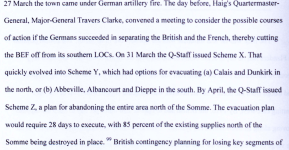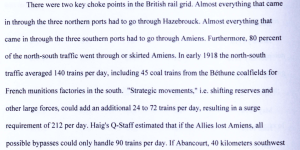If France lost all that coal though, how long would it proceed to take the Germans to move on Paris afterward? Ludendorff IIRC was a man who thought more in terms of "more of my color on the map" than "this given patch on the map is more important that that patch on the map."
And would the BEF be completely destroyed, or would they just retreat to a little bridgehead around the channel ports with a shorter, more easily supplied, and more defensible line? The other thread brought up what seemed like the fair possibility that Lloyd George would overrule Haig, at least a little bit.
The reason I ask these things is because I'm wondering how long the British and French could hold on by their fingernails until some of the yanks show up. Maybe the CPs don't lose, but the terms of a negotiated settlement would play out differently. And if things hold out until, say, October 1918, then you have the internal problems of Austria coming to a boil after Karl I proclaims that Austria will be a union of five peoples (Germans, Ukrainians, Hungarians, Czechs, and Croatians/Yugoslavs).
XXXXXXXXXX
I also wonder what this means for the borders on other fronts. Haifa and Amman fell in September 1918, Damascus on October 1, and Aleppo of October 25, and Mosul-Kirkuk not until after the Armistice of Mudros.
The Germans may still recognize (or tacitly support) the Ukrainian People's Republic. The Soviets also had Kyiv at that point. But a West Ukrainian state west of the Dnieper (with a Hapsburg monarch?) seems possible.
Finland had already declared independence, so there could be German support there.
I don't think German public opinion would be eager for continuing any sort of war in the east after a western surrender though. The Reichstag was far more moderate in its political goals than Hindenburg and Ludendorff were. But supporting their new clients (like Lithuania and Courland) taking up arms to grab lands, and supporting independence movements (Finland, Caucasus, Estonia) seem possible.



